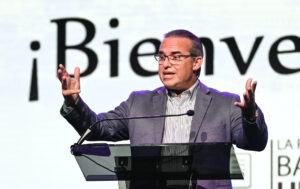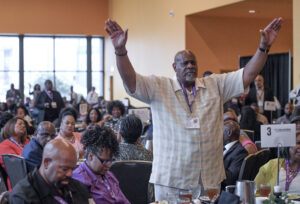
WASHINGTON (BP) — A campaign requesting that McDonald’s and Starbucks implement pornography filters in conjunction with their free Wi-Fi service at U.S. locations is “righteous” and should receive enthusiastic support from “people of faith,” a leader of Southern Baptists’ anti-pornography initiative told Baptist Press.
“If these two businesses decide to block pornography from their free Wi-Fi, others would follow,” Jay Dennis, co-sponsor of the Join One Million Men campaign, said in written comments. “Christians must keep in mind as we approach these companies to be kind, gracious, yet firm in our resolve. Once these businesses understand that making this move is good for business, I think they will act accordingly; at least I hope they would.”
Launched at the 2013 Southern Baptist Convention annual meeting in Houston, Join One Million Men is seeking commitments from 1 million men to live pornography-free lives. The Ethics & Religious Liberty Commission and the Woman’s Missionary Union sponsored the initiative along with Dennis, pastor of First Baptist Church at the Mall in Lakeland, Fla.
Meanwhile a survey conducted by the Barna Group of 388 self-identified Christian men found that more than three-quarters (77 percent) of the respondents ages 18-30 reported viewing pornography at least monthly. The survey also found that 77 percent of respondents ages 31-49 reported looking at pornography at work during the past three months.
The campaign to institute porn filters at McDonald’s and Starbucks was launched Oct. 3 by Enough Is Enough, a nonprofit organization aimed at making the Internet safer for children and families. The EIE campaign is the first phase of a larger “Porn Free Wi-Fi” initiative.
Such an initiative is necessary in part because of news reports that registered sex offenders have been caught viewing pornography and child pornography at McDonald’s in children’s play areas, according to a news release from EIE. A filter also would prevent teens from bypassing parental controls on their wireless devices to view pornography in public Wi-Fi hotspots — something “conscientious and tech-savvy youth can easily” do, the release said.
“Now is the time for corporate America to take a stand against Internet pornography and child pornography that is damaging children,” EIE CEO Donna Rice Hughes said. “For 20 years, children have been spoon-fed a steady diet of online pornography, with few laws or barriers of entry. Recent peer-reviewed research shows the extreme nature of Internet pornography is having destructive impact on the mental, emotional and sexual health of adolescents, including addictive and even criminal behavior.”
Starbucks and McDonald’s both filter pornography at their United Kingdom stores as part of a voluntary self-regulation campaign led by British Prime Minister David Cameron. But as of Oct. 3, Starbucks had not replied to a certified letter from EIE requesting a similar service at U.S. locations. McDonald’s replied, “We appreciate your concern and are looking into options for effective filtering in the U.S,” according to the news release.
Some U.S. businesses like Panera Bread and Chick-fil-A already have pornography filters on their public Wi-Fi. Similar filtering at McDonald’s and Starbucks would affect some 25,000 locations.
EIE is seeking 10,000 signatures on a petition that will be sent to the CEOs of both companies. The petition is located at www.friendlywifi.org.
In related news, the Barna survey, commissioned by Proven Men Ministries, found that born-again and married Christian men are among those who struggle with pornography. A full 95 percent of the 388 self-identified Christian men responding to the survey admitted they have viewed pornography, with 54 percent saying they view it at least monthly.
More than half (55 percent) of self-identified married Christian men reported looking at pornography at least monthly and 35 percent of those surveyed reported having had an extra-marital affair, Barna reported.
Despite the small sampling of just 388 self-identified Christian men polled, Dennis said there is “no doubt” that “the findings of that survey are spot on.”
“There have been several surveys and each of them points to the same conclusion — Christian men struggle with pornography too,” Dennis said. “In my studies and conversations with Christian leaders and pastors, there is a consensus that as many as 80 percent of Christian men are having some level of struggle with pornography, specifically Internet pornography with a delivery system on computers or smart phones.”
Join One Million Men presents an opportunity for churches to address the pornography epidemic, Dennis said.
“Join One Million Men has been an exciting journey that continues to reach men in all churches and denominations,” he said. “We have just revamped our website to make it more user-friendly for men to take the pledge. We have over 25,000 Christian men who have made the commitment.”
The Join One Million Men website ( join1millionmen.org) includes a place for men to register their porn-free commitments as well as a place for women to register their commitments to pray for the purity of men in their lives.
Resources from the WMU’s New Hope Publishing also are available at the site, including Dennis’s book “Our Hardcore Battle Plan: Joining in the War against Pornography”; the companion volume for wives, “Our Hardcore Battle Plan for Wives: Winning in the War against Pornography” by Dennis and Cathy Dyer; and a mobile app for men that delivers daily Scriptures to their mobile devices to help in the fight against sexual sin.
A Spanish version of the campaign resources is being produced for distribution in Latin America beginning in 2015, Dennis said.
Fighting pornography is particularly important because it is robbing men of “the moral authority to lead in their homes and churches,” Dennis said.
“I am 55 years old and most men my age and older were first exposed to pornography through a magazine,” Dennis said. “That has all changed since the Internet. The nature of Internet pornography makes it so dangerous because of the 4 A’s. By that I mean, it is easily accessible, affordable, anonymous and addictive. One look can hook a man. I believe the day the Internet went live, Satan and his forces thought, ‘We now have a tool to silence and chain Christian men.’ Unfortunately, it’s working.”
Dennis encouraged pastors to address pornography now before it destroys the men in their churches.
“My commitment is to continue to challenge men to make a commitment that from today and for the rest of their lives they will not view pornography and that they would incorporate accountability, filtering software, spiritual disciplines and daily surrendering to the Holy Spirit,” he said.















